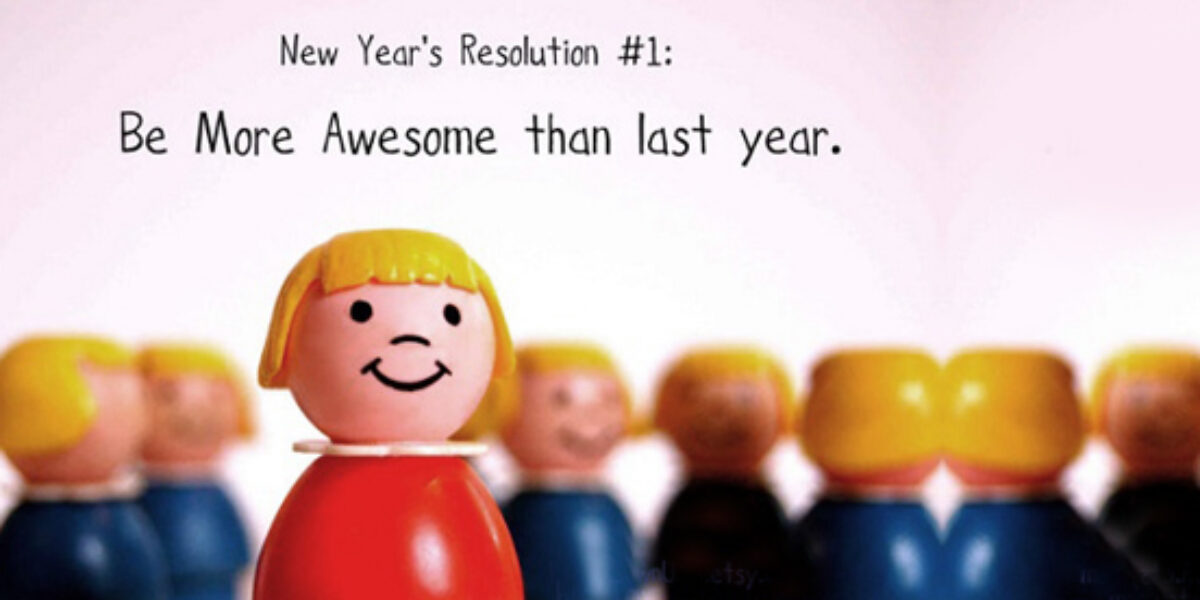As the year begins most of us decide to make some good resolutions, such as: “I should practice some sport, work less, step back and think, take some time for myself, start a diet, spend more time with my family, etc.” Usually the obvious, or hidden, leitmotif is “I should”, since we would like to conform to an idea of ourselves built on the basis of the social models we are living with.
Quite often, however, after two or three months, we fail to stick to these resolutions and in our year-end review we have to admit that “it wasn’t really a good time to start practicing a sport, because at work I had to oversee an important change in my team” or “it was impossible to avoid stress at work because my department underwent the umpteenth reorganization and I had to start everything from scratch” and so forth. We manage to find viable excuses, even though, let’s face it, we can’t help feeling frustrated because of our failure.
Actually, there is no point in feeling frustrated, because our resolutions carry within themselves the seed of failure and are therefore negative for three main reasons.
1/First, these resolutions will only add new duties to our daily lives, which are already burdened with feelings of “I should”, “I must”. It is both useless and ineffective to add the weight of duty when things don’t come naturally. It would be more beneficial to clearly assess our life so as to decide whether we are really ready to start a diet or try to cut stress at work.
2/Dan Ariely*, a professor at Duke University in the United States, who is a specialist in the study of behavioral economics, has proved that man’s nature is profoundly irrational: instead of opting for solutions that are economically profitable, we tend to choose unprofitable solutions. For instance, when choosing between a solution that we ourselves have thought of, and one that has been suggested by another person, we tend to opt for our own solution, even though it may clearly be less advantageous. This leads us to conclude that we are deeply irrational beings, who often make irrational choices with negative consequences. Take smokers, for example: they won’t stop smoking even though they know that tobacco is dangerous for their health. We all know that stress is harmful, yet we sometimes manage to create our own stress and we linger in stressful situations. We will force ourselves to “catch the 7:23 train” even though we could easily meet our daily engagements by taking the 7:32 train.
3/As we have already mentioned, under these circumstances, good resolutions are not only doomed to failure, but they also add a negative burden leading to frustration. It would therefore seem preferable to spare ourselves this self-created liability by realizing that good resolutions have an essentially negative, rather than positive, influence on our lives.
The question is then: how can we replace these useless and frustrating “good” resolutions?
1/ In the first place, we could heed our personal wishes and profit from them in the here and now.
Instead of conforming to an ideal projected into the future, we could simply, and more positively, draw energy and some benefits from the joys of the present.
Instead of saying “I shouldn’t feel so stressed at work”, we should listen to our body. When we feel a drop in energy or the ravages of stress, we should give ourselves the benefit of a pause, i.e. take five minutes off, go out and breathe some fresh air, talk to someone we love, who could help us to step back from that situation and instantly provide a few moments of happiness and renewed energy. Likewise, we could “do some sport” by walking to a subway station on a sunny day; we could “spend more time with our family” by calling our son to ask him how his exam went.
In short, it is more effective to multiply small daily actions rather than going after unattainable goals .We would, in addition, provide moments of joy and thus improve our lives.
2/Dan Ariely has demonstrated in his work our capacity to accustom ourselves to particular situations and material goods. After longing for a beautiful new car, we rapidly forget the pleasure we had been expecting from it and the comfort we now enjoy.
We can turn to our advantage our accustoming capacity if we can prolong the positive feelings associated with pleasant moments in our lives. If we temporarily suspend situations of great comfort before we take them for granted, we will enjoy their beneficial effects longer.
For example a happy love relationship will last longer if it can escape the daily routine.
Similarly, while on a diet, it is more useful to grant ourselves several small sweet and gratifying breaches over a week rather than a single important break whose pleasurable effects will quickly dwindle.
3/This capacity to rapidly accustom ourselves to situations may turn out to be very useful to overcome occasionally unpleasant or difficult circumstances.
As opposed to positive situations, it is better not to interrupt a task we consider negative. It is wiser to carry out in one go a chore we don’t like since the more we work on it the more we adapt to it and thus the chore will seem less burdensome.
In conclusion, let us be good to ourselves each day throughout the New Year. Instead of making grand resolutions that will never be carried out and will only generate frustration, let us grant ourselves some time to make the most of the little joys of the moment, let us stretch our pleasures as much as possible while shortening the unpleasantness of painful chores.
I wish you a wonderful year full of extended joys!
* http://www.danariely.com



